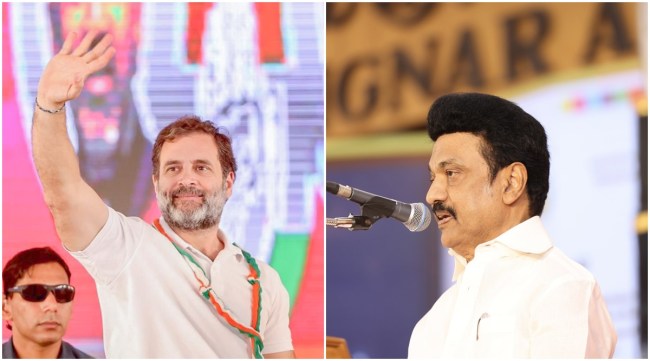Opinion Questions of justice: Caste census to closure in Gujarat riots and killings in Nagaland
Call it Mandal 2.0, its potential to influence national political imagination should not be underestimated. Especially if the Opposition can link it to economic opportunities
 Both Rahul Gandhi and MK Stalin have spoken about social justice during their speeches. (File Photos)
Both Rahul Gandhi and MK Stalin have spoken about social justice during their speeches. (File Photos) Earlier this week, Tamil Nadu Chief Minister M K Stalin announced that the DMK government will erect a life-size statue of V P Singh in Chennai, the state capital. This, Stalin said, is to honour the former prime minister and express Tamil society’s gratitude for his decision to implement the Mandal Commission report. The Mandal Commission recommended reservations for Other Backward Castes in education and employment. Singh’s decision in 1990 triggered a massive backlash from upper caste Hindus in northern India. Some accused the Janata Dal leader of compromising merit in the name of social justice. However, Mandal turned out to be the big idea of the 1990s and transformed politics in northern India. It challenged the political hegemony of the upper castes and led to the rise of a new generation of OBC leaders. Infighting led to the implosion of the Janata Dal and the marginalisation of VP Singh. But leaders such as Mulayam Singh Yadav and Lalu Prasad, who led splinter groups of Janata, turned the new OBC identity assertion to their advantage and established themselves as prominent faces of Mandal politics. Mandal to some extend delayed the rise of BJP that had mobilised Hindus on the basis of the Ayodhya Movement. One could say caste trumped religion. The BJP took the cue and went in for social engineering that saw the emergence of a new crop of leaders from OBC communities, among them Kalyan Singh, Uma Bharti, Shivraj Singh Chouhan, Sushil Modi and so on. Narendra Modi too benefited from this turn towards OBC leaders. If Hindutva has been his big idea, OBC identity was a nuanced subtext. Since 2014, the political common sense started to believe that Mandir ended Mandal; that the BJP had successfully accommodated the Mandal spirit within the Hindutva paradigm. Electoral outcomes mostly agree with this prognosis.
However, the DMK and the Mandal parties of UP and Bihar believe that social justice has scope for a second wind. Kerala CM Pinarayi Vijayan too has endorsed it. The recent Vaikkom Satyagraha centenary celebrations in Kerala, which was attended by Vijayan and Stalin, witnessed a reiteration of social justice politics. And now, the Congress too seems to be in support. Rahul Gandhi in Karnataka last Sunday called for caste census and for the removal of the 50 per cep on SC/ST/OBC reservation.
Earlier this month, the DMK had organised a national conference on social justice, under the banner of the All India Federation of Social Justice conference, which was attended by a large number of opposition parties. Social justice has a long history in Tamil Nadu politics. It started with the Justice Party, which introduced reservation for oppressed and marginalised castes, when it won office in 1916. The Self-Respect Movement under Periyar E V Ramaswami crafted a new anti-caste politics that demanded a total overhaul of the society. It resonated even within the Congress, which was forced to recognise the leadership of K Kamaraj, who was born in a OBC community. The Congress appointed Kamaraj as Chief Minister of Tamil Nadu in 1954. He continued in the post until he was appointed the President of the Indian National Congress in 1963.
The DMK and the Socialists under Ram Manohar Lohia, was unapologetic in weaponising reservations in the battle to end upper caste dominance of the polity and economy. This tradition of social justice politics ran parallel to the Ambedkarite tradition of anti-caste politics. Lohia had exchanged letters with Ambedkar, in the latter’s last stage of life, to bridge the two traditions of anti-caste politics. Periyar, Ambedkar and Lohia saw politics as a means to annihilate caste. Caste had to go because it wasa an impediment to realising human potential, and freedoms.
The Opposition, having failed to stall the juggernaut of Modi-led politics, seems to be exploring the possibility of uniting under the banner of social justice politics. If the Mandal Commission report provided the ballast to the Lohia/JP inspired social justice politics in the 1990s, caste census may emerge as the singular idea that defines Opposition politics in 2023.
The BJP is opposed to the idea of caste census — even Census 2021 has been postponed indefinitely. Caste census has the potential to rupture the Hindu consensus the BJP has carefully crafted over the years. What if the OBCs are many more than what has been projected until now? And, what if the OBC representation in the executive, academia, judiciary etc are not in proportion to their share in population? In that case, should the percentage of reservations for OBCs be increased? Should the 50 per cent gap on reservations also be lifted? Would this be acceptable to non-OBCs? Can the present pan-caste support that the BJP enjoys in the name of religious identity survive this challenge? This is the political moment that the Opposition wants to seize.
Call it Mandal 2.0, its potential to influence national political imagination should not be underestimated. Especially if the Opposition can link it to economic opportunities. It is facile to call the demand for caste census as regressive, but in a society where caste is the primary factor in furthering deprivation, can collection of caste data be avoided? And, is it ethical to argue for continuing upper caste domination of institutions and cornering of opportunities in the name of “merit”? Can the question of representation or exclusion of large sections of the society in jobs, businesses etc. be ignored? In the absence of data, how can public policies be formulated with the intent of reducing social inequality? The fact is southern states that adopted caste-based reservations much before Mandal are better off socially and economically today than the northern states that emphasised “merit”. One reason is that reservations provided a level-playing field for all sections of the society to participate in and enrich social and economic activity.
The Indian Express editorial on this topic (Refreshing Mandal, April 18) was sceptical about the potential of Caste Census in building up the Opposition. It reminded the Opposition that “the flagbearers of Mandal” have let down social justice politics. It recalled how “many of these parties have shrunk into fiefs of the dominant backward castes, often controlled by families”. The editorial also spoke about “the BJP’s steady incursions into Mandal territory… by courting non-dominant groups within the OBC category, or the most deprived or less mobilised sub-castes within the SCs or by now reaching out to Pasmanda or backward caste Muslims with its labharthi politics”.
Pratap Bhanu Mehta (Mirage of social justice, April 22) has argued that “this new social justice agenda represents a narrow and deeply pessimistic politics. It underestimates that caste and communal politics can be aligned and are not antithetical to each other. It cedes the space on matters of truly national importance to the BJP. And it is a measure of how low our expectations are that we can present caste majoritarianism as the paradise that will be the answer to the hell of communal politics.”
The question of justice have come up in other contexts as well. A Gujarat special court Friday acquitted all 67 persons accused in the killing of 11 Muslims at Naroda Gam, Ahmedabad during the 2002 Gujarat riots. One of the accused in the case was BJP leader and later minister, Maya Kodnani, and among those who testified in her favour was now Union Minister of Home, Amit Shah. The Indian Express editorial (Getting Away, April 22) said, “It is a travesty of justice when a court takes 21 years to pronounce its verdict in such a high-profile case. Further, the prosecution’s failure to fix responsibility for the murders after this long drawn out trial casts a shadow over the criminal justice system.”
Last week, it was reported that the Department of Military Affairs under the Ministry of Defence has refused sanction to prosecute the 30 Army personnel who were allegedly involved in the December 2021 killings of 13 civilians in Oting, Nagaland. A botched Army operation had resulted in the deaths. The Indian Express editorial (‘Don’t Fail the Test’, April 18) urged the government to reconsider its stance.
That’s all for this week.
Best,
Amrith
Amrith Lal is Deputy Editor with the Opinion team






